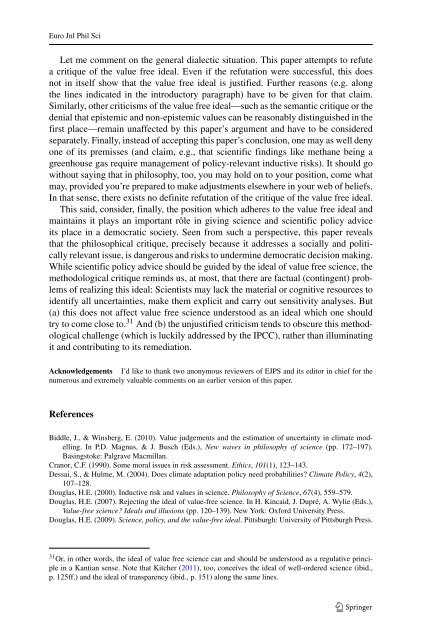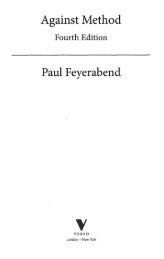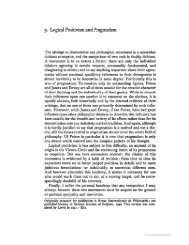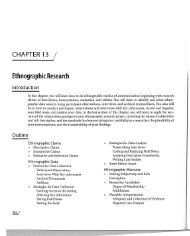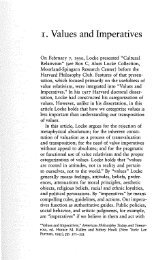In defence of the value free ideal
In defence of the value free ideal
In defence of the value free ideal
- No tags were found...
Create successful ePaper yourself
Turn your PDF publications into a flip-book with our unique Google optimized e-Paper software.
Euro Jnl Phil SciLet me comment on <strong>the</strong> general dialectic situation. This paper attempts to refutea critique <strong>of</strong> <strong>the</strong> <strong>value</strong> <strong>free</strong> <strong>ideal</strong>. Even if <strong>the</strong> refutation were successful, this doesnot in itself show that <strong>the</strong> <strong>value</strong> <strong>free</strong> <strong>ideal</strong> is justified. Fur<strong>the</strong>r reasons (e.g. along<strong>the</strong> lines indicated in <strong>the</strong> introductory paragraph) have to be given for that claim.Similarly, o<strong>the</strong>r criticisms <strong>of</strong> <strong>the</strong> <strong>value</strong> <strong>free</strong> <strong>ideal</strong>—such as <strong>the</strong> semantic critique or <strong>the</strong>denial that epistemic and non-epistemic <strong>value</strong>s can be reasonably distinguished in <strong>the</strong>first place—remain unaffected by this paper’s argument and have to be consideredseparately. Finally, instead <strong>of</strong> accepting this paper’s conclusion, one may as well denyone <strong>of</strong> its premisses (and claim, e.g., that scientific findings like methane being agreenhouse gas require management <strong>of</strong> policy-relevant inductive risks). It should gowithout saying that in philosophy, too, you may hold on to your position, come whatmay, provided you’re prepared to make adjustments elsewhere in your web <strong>of</strong> beliefs.<strong>In</strong> that sense, <strong>the</strong>re exists no definite refutation <strong>of</strong> <strong>the</strong> critique <strong>of</strong> <strong>the</strong> <strong>value</strong> <strong>free</strong> <strong>ideal</strong>.This said, consider, finally, <strong>the</strong> position which adheres to <strong>the</strong> <strong>value</strong> <strong>free</strong> <strong>ideal</strong> andmaintains it plays an important rôle in giving science and scientific policy adviceits place in a democratic society. Seen from such a perspective, this paper revealsthat <strong>the</strong> philosophical critique, precisely because it addresses a socially and politicallyrelevant issue, is dangerous and risks to undermine democratic decision making.While scientific policy advice should be guided by <strong>the</strong> <strong>ideal</strong> <strong>of</strong> <strong>value</strong> <strong>free</strong> science, <strong>the</strong>methodological critique reminds us, at most, that <strong>the</strong>re are factual (contingent) problems<strong>of</strong> realizing this <strong>ideal</strong>: Scientists may lack <strong>the</strong> material or cognitive resources toidentify all uncertainties, make <strong>the</strong>m explicit and carry out sensitivity analyses. But(a) this does not affect <strong>value</strong> <strong>free</strong> science understood as an <strong>ideal</strong> which one shouldtry to come close to. 31 And (b) <strong>the</strong> unjustified criticism tends to obscure this methodologicalchallenge (which is luckily addressed by <strong>the</strong> IPCC), ra<strong>the</strong>r than illuminatingit and contributing to its remediation.Acknowledgements I’d like to thank two anonymous reviewers <strong>of</strong> EJPS and its editor in chief for <strong>the</strong>numerous and extremely valuable comments on an earlier version <strong>of</strong> this paper.ReferencesBiddle, J., & Winsberg, E. (2010). Value judgements and <strong>the</strong> estimation <strong>of</strong> uncertainty in climate modelling.<strong>In</strong> P.D. Magnus, & J. Busch (Eds.), New waves in philosophy <strong>of</strong> science (pp. 172–197).Basingstoke: Palgrave Macmillan.Cranor, C.F. (1990). Some moral issues in risk assessment. Ethics, 101(1), 123–143.Dessai, S., & Hulme, M. (2004). Does climate adaptation policy need probabilities? Climate Policy, 4(2),107–128.Douglas, H.E. (2000). <strong>In</strong>ductive risk and <strong>value</strong>s in science. Philosophy <strong>of</strong> Science, 67(4), 559–579.Douglas, H.E. (2007). Rejecting <strong>the</strong> <strong>ideal</strong> <strong>of</strong> <strong>value</strong>-<strong>free</strong> science. <strong>In</strong> H. Kincaid, J. Dupré, A. Wylie (Eds.),Value-<strong>free</strong> science? Ideals and illusions (pp. 120–139). New York: Oxford University Press.Douglas, H.E. (2009). Science, policy, and <strong>the</strong> <strong>value</strong>-<strong>free</strong> <strong>ideal</strong>. Pittsburgh: University <strong>of</strong> Pittsburgh Press.31 Or, in o<strong>the</strong>r words, <strong>the</strong> <strong>ideal</strong> <strong>of</strong> <strong>value</strong> <strong>free</strong> science can and should be understood as a regulative principlein a Kantian sense. Note that Kitcher (2011), too, conceives <strong>the</strong> <strong>ideal</strong> <strong>of</strong> well-ordered science (ibid.,p. 125ff.) and <strong>the</strong> <strong>ideal</strong> <strong>of</strong> transparency (ibid., p. 151) along <strong>the</strong> same lines.


